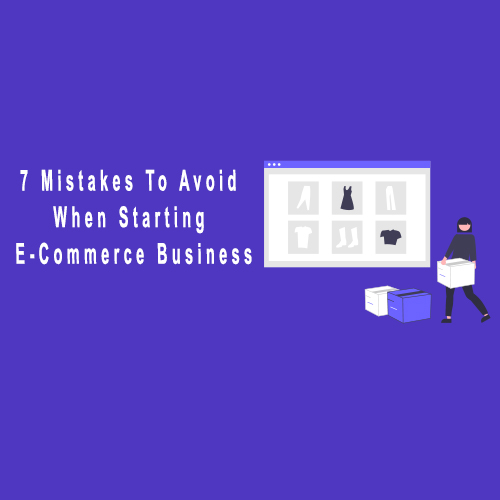When you’re starting an e-commerce business, there are some mistakes that you can make that will affect your bottom line and keep you from making the money you want to make. While it may seem like it’s hard to avoid these mistakes when launching a new e-commerce business, if you do your research ahead of time and take the necessary precautions, you can avoid them completely and be successful right out of the gate. Here are seven mistakes to avoid when starting your own e-commerce business.
Table of Contents
1) Don’t launch without a niche
Many entrepreneurs fail because they create their website without a specific target audience in mind. These founders assume that they’ll be able to reach out to a broad audience and make a splash, but really all they end up doing is diluting their brand message and confusing anyone who visits their site. You don’t want to be everything for everyone, so avoid making your online store too general by clearly identifying your ideal customer before you begin setting things up. Once you know who you want to cater to, try writing down ten ways that person could contact you or purchase from your website.
2) Don’t fall into the funding trap
Many entrepreneurs think they need to raise capital in order to start a business. It may be tempting, but don’t let yourself get caught up in that idea. Instead, use your personal savings to start a company—you don’t want to end up struggling financially while your business is getting off the ground. If you can’t afford it on your own, consider taking out a loan or crowdfunding options like Kickstarter or Indiegogo . Just remember: You still have to find ways to stand out and succeed in order for those investments to pay off! Otherwise, you may end up starting an e-commerce company with little more than debt and disappointment.
3) Don’t do everything yourself
In business, a common mistake new entrepreneurs make is trying to do everything by themselves. If you’re starting a business that requires technical know-how or expertise (like website design), it’s important to hire professionals in those areas. You don’t have to be a graphic designer or programmer to run an ecommerce business, so don’t act like you do. Chances are good that if you try to do everything yourself, your final product will look amateurish and feel unprofessional. Hire experts who understand your industry and can create assets that reflect your brand without falling into cliche. It’ll pay off in dividends down the road—as long as you get organized with contracts and quality checks on deliverables, of course!
4) Set up your website before you have products
It may sound counterintuitive, but you’ll need a website before you have products to sell. If your e-commerce business has no real product, people will simply visit your site, browse around and leave (or, worse yet, go to your competitors’ sites). You won’t have any income without traffic or products for sale—so make sure to get a website set up with information about your business and contact details. Then start building trust with customers by engaging in thoughtful communication on social media. After all, you want potential customers who visit your site to see that you are an actual company and not a fake storefront! If you don’t have time to design and build a site yourself, hire someone who can create one for you.
5) Don’t ignore social media
With more than 2 billion active users worldwide, Facebook is one of your best tools for reaching new customers. Whether you’re selling hardware or widgets, getting people to notice you on Facebook will be a critical factor in how successful your business is from day one. It’s also extremely cost effective; consider that only two percent of e-commerce merchants generate more than $100,000 per month. In comparison, four percent of all U.S. companies have an active Facebook page—so it stands to reason that social media can help you stand out even among your competitors who are already established.
6) Don’t underestimate hiring an employee
One of your first decisions when you’re running a business is whether or not to hire someone. While hiring an employee can be expensive and a huge headache, it can also be one of your best options for bringing in more money. As your business grows, it will become increasingly difficult to handle all aspects of company operations alone—and that’s what employees are for. If you don’t want to pay an employee a salary, consider paying them based on their output instead (for example, commission). There’s nothing wrong with working hard while spending little time worrying about day-to-day operations.
7) Keep your expenses low
Of course, if you’re planning to start an e-commerce business, you need to have your own website and e-commerce platform. The other expenses are not too high when starting up an online store. However, once you choose your e-commerce platform, it’s very important that you learn how to use it properly. If not, even with a small investment, it may bring unexpected costs such as paying for more bandwidth or spending more time on fixing technical problems and errors. Therefore, if you are planning to start a new online store, keep your expenses low and make sure that everything works properly before doing any marketing for your business.
Also check : How to Earn Money Online in Nepal
